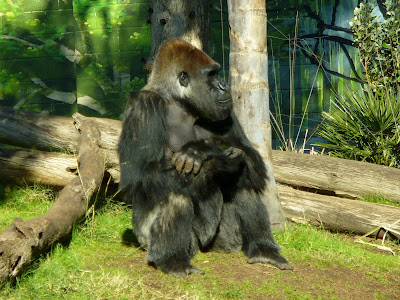I'm finally ready to admit the truth: I'm addicted to the evolutionary culture wars. Now, there's no need to lecture me; I already know what you're going to say. Sure, the culture wars are bad for you. I'm fully aware that they rot your brain and are more addictive that an eight-ball of meth laced with nicotine; I'm not ignorant to the fact that the evolutionary/creationism argument is well-known as the "gateway" conflict, leading inexorably toward more "hardcore" wars regarding abortion rights and
laissez-faire capitalism; and I've often heard it said that those who engage in culture war-related activities do so because of deep-seated personal issues that have not been properly resolved; But you know what? I really don't care! I like my culture wars, okay? Is that so bad? Sure I spend hours each day reading (and sometimes participating in) obscure and often inane arguments on numerous blogs and message boards, but I could quit anytime I wanted to. Really, I could. I just don't want to right now. My habit hasn't been a problem for me so far, and I see no reason why it has to be one in the future.
Right. . .
Having gotten that out of the way, I came across this short
article by Charles Colson (of, among other things, Watergate fame) that I wanted to share. It's just so silly that I couldn't not comment on it. In his brief commentary, Colson heaps praises upon Phillip Johnson, the so-called "Father" of the Intelligent Design movement. It's short, so I'm just going to quote the entire thing:
How do you honor a man who started a groundbreaking movement that challenged the scientific establishment and is changing the way the world thinks about the origins of life?
Phillip Johnson’s friends came up with a great way to answer that question. In honor of Phil’s many accomplishments, they have commissioned and published a collection of essays, in a book titled Darwin’s Nemesis. That’s the perfect title, because that’s exactly what Phil has become over the past fifteen years. This feisty Berkeley law professor became the unlikely spearhead of the intelligent design movement with the publication of his book Darwin on Trial, in which, from the perspective of a skilled lawyer, he examined and cross-examined Darwinism and found gaping holes. His legal and rhetorical training had convinced him that the Darwinists were acting like people with “something to hide.” Indeed, they are.
His investigation showed him exactly what they were hiding. As geophysicist Stephen Meyer puts it, the best Darwinists can put forth is “a panoply of euphemism and wishful thinking masquerading as evidence.” So Phil dared to start questioning what many believed to be unquestionable and to enlist many scientists to start questioning it as well. The rest, as they say, is history.
Through all the controversy—and just plain mud-slinging—that followed the publishing of Darwin on Trial, Phil has maintained his stance, continuing his lawyerly probing and careful research, and he has kept his good humor and graciousness. In these ways, he serves as a magnificent example to all of us involved in worldview teaching.
Just the list of authors who have contributed to Darwin’s Nemesis shows the effectiveness of Phil’s approach. It’s full of essays by distinguished scientists and philosophers who support the intelligent design movement. And it even includes a couple of articles by critics of intelligent design, including philosophy professor and evolution advocate Michael Ruse—the kind of balance you’d like to see in classrooms. In the contentious debate that surrounds the intelligent design vs. evolution issue, getting the participation of someone like Ruse is a testimony to Phillip Johnson.
There’s no doubt that Phil’s willingness to encourage the work of scientists and help create a network for them has allowed the movement to flourish. This book really shows just how far the intelligent design (ID) movement has progressed in a relatively short time, despite the best efforts of many Darwinists to shoot it down—because, as is becoming clearer and clearer, ID has the evidence on its side.
But Darwin’s Nemesis is far more than a tribute to one man—it’s an insightful, enjoyable, highly readable explanation of the intelligent design movement as a whole. And as the passages I’ve quoted demonstrate, this is very much in keeping with Philip Johnson’s practice of keeping the focus on the movement and the questions it is asking, not on himself. The paradox is that by doing this, he has shown how one informed and dedicated individual can literally shape the course of history—just one more lesson from Phil Johnson’s work from which we all can benefit, and one more reason why he’s one of my personal heroes.
Let's be blunt: Charles Colson is talking out of his ass. Here are a few things he didn't mention:
* The ideas of Phillip Johnson are neither ground-breaking nor are they particularly challenging to the scientific community.
* Despite quite a lot of popular-level book, efforts to introduce ID into high school classrooms, propaganda press releases and thousands of dollars spent on marketing, ID has made little headway in its quest for acceptance by the scientific community, and as Philosopher and ID-proponent Paul Nelson has
admitted, there is currently no actual scientific theory of Intelligent Design.
*Less than a year ago, in the landmark ID-case,
Kitzmiller v. Dover, Judge Jones, a Bush-appointed conservative Christian, ruled that ID is not science and has no place in science class (see
here for a copy of the ruling. It's actually quite an interesting read.)
The plain fact of the matter is that there is little reason to believe that ID will ever find acceptance by any substantial percentage of the relevant scientific community--ie., Biologists. This is the case, I believe, for at least two reasons:
1. Despite countless Creationists' assertions to the contrary, Evolutionary Biology is scientifically productive field of research, and there really is an enormous amount of evidence favoring the idea that life on earth is a product of descent with modification from earlier organisms via, among other things, the creation of genetic variabilty through mutation spread of this inherited variability through differential reproductive succes (ie., Natural Selection). Does that mean that Biologists know everything that they would like to know about the history and diversity of life? Not at all. Does it mean that all aspects of the currently-accepted Evolutionary theory will turn out to be correct in every case ? Again, no. But this also doesn't mean that God--err. . .the Designer--should be inserted as an answer for questions we haven't figured out yet. That's the great thing about science; there's always something more to learn and discover.
2. The second--and in my opinion, too commonly overlooked--reason is that, unlike mainstream evolutionary theory, ID really does nothing to satisy the insatiable hunger to understand how and why the world around us works that is probably the single biggest driving force behind the research that scientists undertake. Boiled down to its most basic form, ID simply states that certain features of life (there is a seperate field of ID that deals not with life but with attributes of the universe itself that I'm ignoring here) are best explained as the product of an intelligent agency. But when pressed to make statements about who the designer is and when, how, and for what reason these designs were implemented, ID-proponents are characteristically silent (except, of course, in front of "safe" audiences consisting of conserative Christians. Then, they're very open about the Designer being synonymous with the Christian God). To drudge up an old euphemism, ID simply cannot and will not cut the mustard with most scientists because it doesn't even attempt to answer most of the questions that they're asking.
It's obvious that Chuck Colson knows next to nothing about Biology (or if he does, he's doing a stupendous job of hiding it). That's not to say that I'm an expert myself. I'm certainly not. But I know enough to spot bullshit when I see it; and Colson's "commentary" is a nice pile of hot, steaming, poo.
 Near the entrance to the zoo is a small lagoon with flamingos and quite a few ducks. Adeptly serving as the Zoo's unofficial
Near the entrance to the zoo is a small lagoon with flamingos and quite a few ducks. Adeptly serving as the Zoo's unofficial  Exhausted after a tiring wrestling match with his two-year-old son (not pictured because they were very close to the glass, and my attempts to reduce the glare were unsuccessful; you'll just have to trust me that it was hilarious.), Satu, a Sumatran orangutan--and quite possibly my favorite animal in the zoo--rests in the morning sunlight while eating a snack.
Exhausted after a tiring wrestling match with his two-year-old son (not pictured because they were very close to the glass, and my attempts to reduce the glare were unsuccessful; you'll just have to trust me that it was hilarious.), Satu, a Sumatran orangutan--and quite possibly my favorite animal in the zoo--rests in the morning sunlight while eating a snack. Memba, a 37-year-old silverback gorilla (of the western lowland variety) and head of a seven member troop, surveys his kingdom. . .
Memba, a 37-year-old silverback gorilla (of the western lowland variety) and head of a seven member troop, surveys his kingdom. . . Mom carries her nine-month-old baby in typical gorilla fashion.
Mom carries her nine-month-old baby in typical gorilla fashion. Mumba from an alternate view--they call 'em silverbacks for a reason!
Mumba from an alternate view--they call 'em silverbacks for a reason! A two-week-old Angolan Colubus monkey and its (the keepers haven't determined its sex yet) mother.
A two-week-old Angolan Colubus monkey and its (the keepers haven't determined its sex yet) mother. A bonobo mother and her son (I think!). Bonobos are the rarest--and quite possibly smartest--of all the non-human apes, and are closely related to chimpanzees (which makes them closely related to us, as well) . Located only in a small area of the Democratic Republic of Congo, these beautiful primates are on the verge of extinction.
A bonobo mother and her son (I think!). Bonobos are the rarest--and quite possibly smartest--of all the non-human apes, and are closely related to chimpanzees (which makes them closely related to us, as well) . Located only in a small area of the Democratic Republic of Congo, these beautiful primates are on the verge of extinction. A male bonobo is. . .well, I think you can figure it out.
A male bonobo is. . .well, I think you can figure it out. A free-flying hummingbird looks for something tasty to drink.
A free-flying hummingbird looks for something tasty to drink. Clyde, the magnificently nappy and adorable dominant-male orangutan. He is also the father of Satu.
Clyde, the magnificently nappy and adorable dominant-male orangutan. He is also the father of Satu. Satu grooms Clyde before bedtime. Despite the lower qualiy of this picture, it's one of my favorites from the entire day. It's rare that I see these two orangutans interact (and when I do, it's usually because Satu has decided to antagonize his father), so I was very glad to be able witness them sharing an affectionate moment.
Satu grooms Clyde before bedtime. Despite the lower qualiy of this picture, it's one of my favorites from the entire day. It's rare that I see these two orangutans interact (and when I do, it's usually because Satu has decided to antagonize his father), so I was very glad to be able witness them sharing an affectionate moment.
















